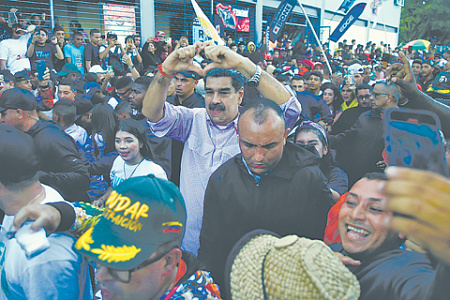
Venezuelan President Nicolás Maduro has issued a fervent appeal to the White House to halt what he warns could become a “tragedy for the entire Western Hemisphere,” in reference to an escalating military confrontation. His urgent plea comes amidst reports that he had previously offered the United States access to Venezuela’s vast energy resources in a bid to avert conflict. Meanwhile, President Donald Trump has cryptically declared that he has “already made a decision” concerning the Latin American nation, fueling widespread speculation and anxiety across the region.
The tension has reached a critical point in recent days, with Trump’s statement on November 14 following high-level briefings. Asked by journalists about a potential military operation in Venezuela, he stated, “I have already made a decision – yes. I cannot tell you what it is, but I have already made it.” This ambiguous declaration has only intensified fears of imminent action.
Adding another layer to the unfolding drama, prominent Venezuelan opposition figure and Nobel Peace Prize laureate Maria Corina Machado on November 15 released a three-minute audio recording via social media. In her powerful message, Machado directly appealed to the nation’s armed forces, urging them to lay down their arms and align themselves with the nationwide movement for freedom. While it remains uncertain if military personnel will heed her call, Machado, currently operating in clandestinity, has affirmed her intention to emerge publicly to accept the 2025 Nobel Peace Prize in Oslo. The committee reportedly awarded her the accolade for “her tireless struggle for democracy and the rights of the Venezuelan people and for the striving to achieve a just and peaceful transition of the country from dictatorship to democracy.”
American press reports and statements from some officials indicate that President Trump continues to be presented with various policy options concerning Venezuela. Among these, sources suggest, is the possibility of a deal with Caracas. The New York Times, citing informed sources, claims that President Maduro had offered the U.S. control over a significant portion of Venezuela’s oil reserves in exchange for an end to the confrontation. While this proposal was reportedly rejected, it was not definitively dismissed, with the newspaper asserting that Venezuelan-American contacts remain open. The NYT further interprets the conspicuous buildup of U.S. naval forces in the Caribbean as a strategic move to pressure Maduro into accepting more favorable terms for such a potential agreement.
Indeed, the U.S. military presence in the Caribbean Sea has grown substantially, now encompassing over 15,000 service members, a dozen destroyers, and the formidable USS Gerald R. Ford aircraft carrier, which arrived recently. Officially, the increased military footprint is justified by President Trump’s declared campaign against drug traffickers. This operation has reportedly resulted in 20 strikes against vessels in the Caribbean suspected of drug trafficking, leading to 80 casualties. The Pentagon recently announced the initiation of “Operation Southern Spear” specifically targeting Latin American drug cartels.
However, a critical analysis of the situation raises significant questions about the true objectives. No concrete evidence has been provided to substantiate the U.S. claims that the destroyed vessels were linked to drug trafficking. Furthermore, critics point out that if the primary goal is truly to sever drug supply lines, Washington’s focus would more logically be on Mexico and Colombia, where such operations are not currently planned despite internal White House discussions. These circumstances lead many observers to conclude that the core objective behind Trump’s actions in the region is fundamentally regime change in Venezuela, aiming to install a government more amenable to Washington’s interests.
In his impassioned address on November 15 during a gathering of lawyers in Caracas protesting the U.S. military presence, President Maduro directly appealed to the American people: “I appeal to the people of the United States: stop the insane hand of those who give orders to bomb, kill and unleash war in South America and the Caribbean. Stop the war – no to war!” His speech, broadcast nationwide on Venezolana de Televisión (VTV), called for an end to “endless” and “unjust” wars, drawing parallels to past conflicts by stating, “Enough with Libya. Enough with Afghanistan.”
According to Viktor Kheifets, director of the Center for Ibero-American Studies at St. Petersburg State University, Maduro’s appeals are not unprecedented. Kheifets notes that while Maduro’s rhetoric towards the U.S. government can be harsh, he has consistently avoided direct attacks on President Trump, always signaling Venezuela’s readiness for negotiations to avoid military escalation. The expert revealed that negotiations between Caracas and Washington did occur earlier this summer but were abruptly halted in late July or August. Citing American media reports, Kheifets suggested that the breakdown was influenced by Secretary of State (Mark) Rubio, who allegedly persuaded Trump to intensify pressure on Venezuela, believing it would galvanize Hispanic electoral support domestically.
Despite President Trump’s assertion of having already made a decision, Kheifets cautions against assuming immediate action. “In any case, he will not inform the whole world and the other side of his plan with minute precision in advance,” the expert stated. Kheifets outlined three potential military scenarios should Trump indeed opt for intervention: a) limited airstrikes against maritime or land targets; b) a targeted raid to apprehend President Maduro and his inner circle, akin to the 1989 U.S. operation in Panama to oust Manuel Noriega; or c) a full-scale ground operation, similar to those in Afghanistan or Iraq, aimed not only at overthrowing the Venezuelan government but also at occupying the country. The international community watches closely as the crisis teeters on the brink of profound regional implications.
